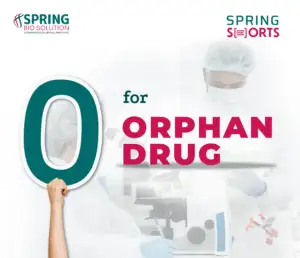Glossary of Clinical Terms
This section provides definitions for words and terms used in Clinical Terms

An “orphan drug” is a drug or biological product that is developed to treat a rare disease or a health condition. Every country has a specific definition to qualify a rare disease/ health condition based on the population and incidence of occurrence of that particular disease.
In the United States as a disease or condition that affects less than 200,000 people is considered a Rare disease. In the European Union, rare diseases are classified as life-threatening or chronically debilitating diseases with low prevalence such as less than 5 per 10,000 population. In India, a disease or disorder is defined as rare when it affects fewer than 1 in 2500 individuals.
The medicines developed for these rare diseases are called Orphan drugs and manufacturers engaging in developing orphan drugs for rare diseases receive certain incentives from the government.
Haem arginate, for instance, is an orphan medication that treats hereditary coproporphyria, acute intermittent porphyria, and variegate porphyria.
Are you looking for global sourcing of comparator drugs in different dosage forms with specific expiry requirements to help with clinical trials and BA/BE studies?

